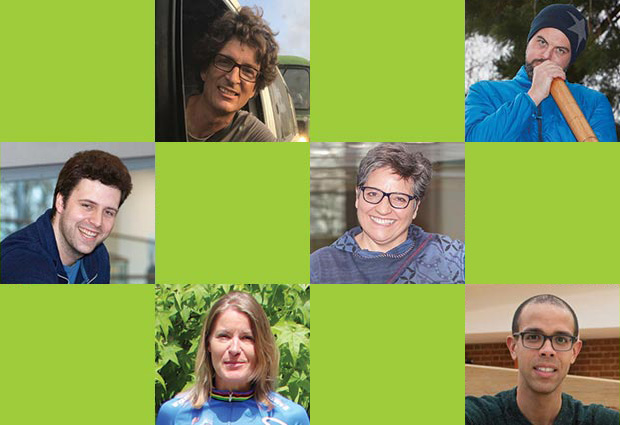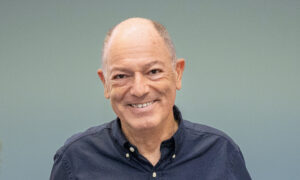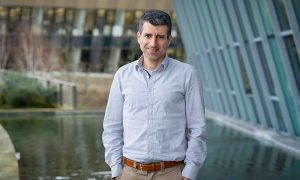
Humans of EMBL: Past lives
Discover the past lives and journeys that brought people to EMBL

Andrew Hercules
User Experience Designer, EMBL-EBI Cambridge
I tell people I’ve had 4 or 5 careers so far! Over the last ten years, I have reinvented myself a number of times. As an employment counsellor, one of the biggest things was helping students to find summer jobs, so helping with CVs, cover letters, application forms, interviews, etc. I think the most rewarding thing about that was helping students find their first job and knowing that you’ve really helped someone with a skill that they’re going to have to use multiple times throughout their life. In fact, about 5 years ago, someone re-connected with me on Facebook after they got their first job. It was a very gratifying moment to know that you can have that kind of impact on someone’s life.
The most rewarding thing was helping students find their first job.

Justin Graham-Parker
Kindergarten Assistant, EMBL Heidelberg
I played didgeridoo for the first time at a birthday party when I was 18 and that very same week I was like, “I have to have one!”. I immediately located a patch of giant bamboo, growing in the grounds of a hospital. I went in and asked them if I could have a piece. They had no problem with it, but I had a huge problem getting it out because giant bamboo grows about 8-9 metres up! Since then, I’ve always built didgeridoos, sold them and played them.
The trick is the circular breathing, where you’re pushing air out of your mouth and breathing in at the same time so you have a continuous tone. The longest I’ve been able to do it in one go was for an hour and a half. At least I think it was an hour and a half. I was playing with a pianist at a party in South Africa and we were just playing and playing and playing. After a certain amount of time you don’t know what you’re playing or even if you’re playing, you get kind of drowsy and you slip in and out. Its only when you stop that you realise your lips are all full of blisters.
The didgeridoo has guided me quite a lot throughout my life and connected me to lots of interesting people. When I first moved to Germany I played didgeridoo in a rock band called “Shiny Spooky Rabbit” and now I actually play the didgeridoo with the kids when I’m in the kindergarten! The kids love it! I have little theatrical pieces, using different didgeridoos. If you use a very high-toned didgeridoo, you can pretend you’re a little bee flying around the whole room and the deep-toned didgeridoo can vibrate the whole floor.
I was playing the didgeridoo with a pianist at a party in South Africa

Elise Bralet
Liaison Officer, EMBL Grenoble
When I lived in the Netherlands, I loved sports and organising sporting events. Then, when I moved to France, several French friends mentioned the Dutch Foundation Alpe d’HuZes. It’s this really incredible cycling event that raises money to fight cancer. Since 2006, more than 150 million euros have been raised. We have up to 5 000 people each year, mainly from the Netherlands, who cycle, run, or just walk up the Alpe d’Huez in France, up to 6 times in one day. That explains the name Alpe d’HuZes; “zes” means 6 in Dutch.
The organisation is huge, but everyone is a volunteer and all the sponsor money goes to a special fund within the Dutch Cancer Society. It’s really tough to organise an event with so many people. My main job within Team France was to liaise with the local administrations, translate, and take care of logistics, but we also had a lot of help from the city halls, tourist offices, the prefecture, the police and the emergency help.
All sorts of people go up the mountain; adults and children, people who have cancer, and those who have lost family members or friends to cancer. I thought they were never going to make it up the mountain, but with the help of the others, a push on the back or a shoulder to cry on, they did. There was an amazing feeling of solidarity and unity. It’s something you feel but it’s so difficult to describe. There were a lot of laughs during the day but also people crying, it was a really strange and incredibly emotional feeling.
One particular moment really stands out. Two sisters, who volunteered with us every year, lost their mother to cancer. Their father said “I’m going to cycle the Alpe d’HuZes, but I’m going to start in the Netherlands” …and he did it. When I was in the car, going to meet with the other members of Team France, I saw the father with his bike and his daughters on the side of the road in the suburbs of Grenoble. I thought “OK! I have to stop and say hello!” They had lost somebody so important to them, and they still came back. It was a really emotional moment to meet them again.
There was an amazing feeling of solidarity and unity.

Jonas Hartmann
Predoctoral Fellow, EMBL Heidelberg
I never loved training to be a chef, but I simply didn’t question it. I didn’t love school but everybody told me you have to go to school, right? It’s not optional. Then you have to do an apprenticeship, you have to work and you have to earn money. No one ever said you have to be passionate about what you’re doing all day long – that’s not a thing. It should be, of course, but no one ever asked me “well, why are you doing something you don’t like doing?” That was just normal.
Now, I’ve come to enjoy cooking and I still cook a lot, but it’s different if you cook for yourself or for friends, compared to a restaurant. In a restaurant you’re just cleaning and peeling potatoes. Then slowly you learn to cook. It’s a bit of an assembly line where you just pump it out. In most restaurants, including the one I was trained at, it’s really only the boss who gets to be creative – they put together the menu.
It would have been the path of least resistance for me to just continue and not be happy. You can get almost into a stupor where you live only for the free time. The job makes you unhappy but it’s not something you register that much, it’s just background noise that you drown out by looking to the next weekend. But I think if you can overcome that and find something you’re passionate about, life changes completely.
It would have been the path of least resistance to just continue.

Roné Pawson
Training and Development Officer, EMBL Heidelberg
I was the head of a musical theatre academy in South Africa for 12 years. We were called “Stagedoor Academy”, like the artists’ entrance to the theatre. Our students had decided musical theatre was the career they wanted to pursue and they had to pass international examinations in singing, acting, and dancing. It was a very vibrant, creative and innovative environment to work in, full of unexpected moments. I could always listen in on anything, from opera singing to hip hop music; I could watch the most beautiful contemporary and lively jazz; or see our students performing deeply moving monologues on stage. I laughed at their stage make-up experiments and remember nervously watching them from the wings, before they went on stage.
One colleague of mine, who was the opera singer and opera trainer, loved Japan and her experiences there. She was telling us about her trip to Japan when she suddenly burst into song, singing this Japanese folk song which she had learnt there. As it wasn’t an opera song, I got to hear her “normal” singing voice, the one we seldom hear from opera singers! It was absolutely fantastic, such a magical moment and so different from anything we had heard before, it was beautiful. People often ask me if it was difficult to work with artists. My answer is always “yes and no… but always inspirational!”.
It was a very vibrant environment to work in, full of unexpected moments.

Cornelius Gross
Deputy Head of Unit and Senior Scientist, EMBL Rome
Actually, this was something my parents wanted to do with me as a kid, in the 1970s. We did a lot of travelling and camping together and I distinctly remember my father, in 1977 or ‘78, researching the idea. I remember looking at the catalogues for VW campers – they had just come out with a diesel engine. The idea was to drive to India, like people had done in the ‘60s and ‘70s, following the Silk Road. That was the tail end of people driving through Iran, Afghanistan, and India. Then there was the Iranian Revolution. As my parents had American passports, we couldn’t go anymore.
This summer, with my wife and kids, we took the classic Silk Route and went through 11 countries. Nine of them needed visas and that can get very complicated, but to be honest, everything worked out incredibly smoothly. The first day you entered into a new country, everybody was kind of anxious. You had to figure out the system, how this country works, and where you’re going to stay overnight, but fundamentally, I wasn’t that afraid. I had always been curious about it.
Iran in particular was a fascinating country. I hadn’t been before and I didn’t know exactly what to expect. I commented on something to an older man in the street and I could tell, there was something special about him. His eyes were very… in Italian you’d say “Sveglio”; he was very awake. He was the only person I met who was both educated and free speaking enough to give me some insights into the inner workings of Iran. Plus, as he was of an older generation who had grown up during the Shah, he had seen how things had changed, with the current regime.
The first day you entered into a new country, everybody was kind of anxious

This text was modified in 2024 to remove the details about a person following a personal request.

Some of the most fascinating questions in science are about origins. As part of our latest editorial theme, we’re exploring the idea of origins at EMBL. We want to talk about the origins of biological systems, about our people and the paths that brought them here, and the discoveries and ideas that have their origins here.


